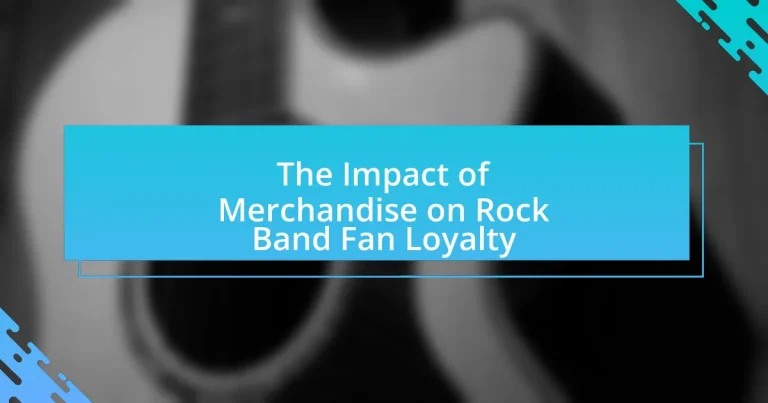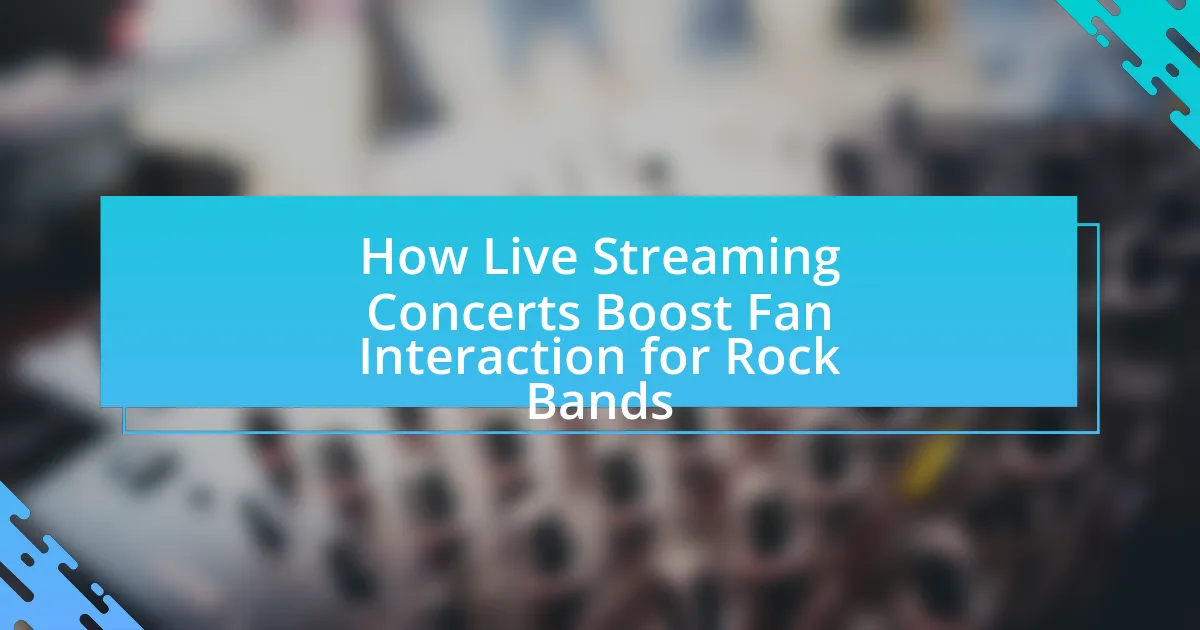The article examines the impact of merchandise on rock band fan loyalty, highlighting how tangible items like clothing and memorabilia foster a sense of belonging and emotional connection among fans. It discusses the correlation between merchandise purchases and increased concert attendance, as well as the psychological effects of ownership on fan engagement. Key factors influencing fan loyalty include the quality and exclusivity of merchandise, the types of items preferred by fans, and the role of social media in promoting these products. The article also outlines strategies for bands to enhance merchandise effectiveness, ensuring alignment with fan expectations and avoiding common pitfalls in merchandise strategy.
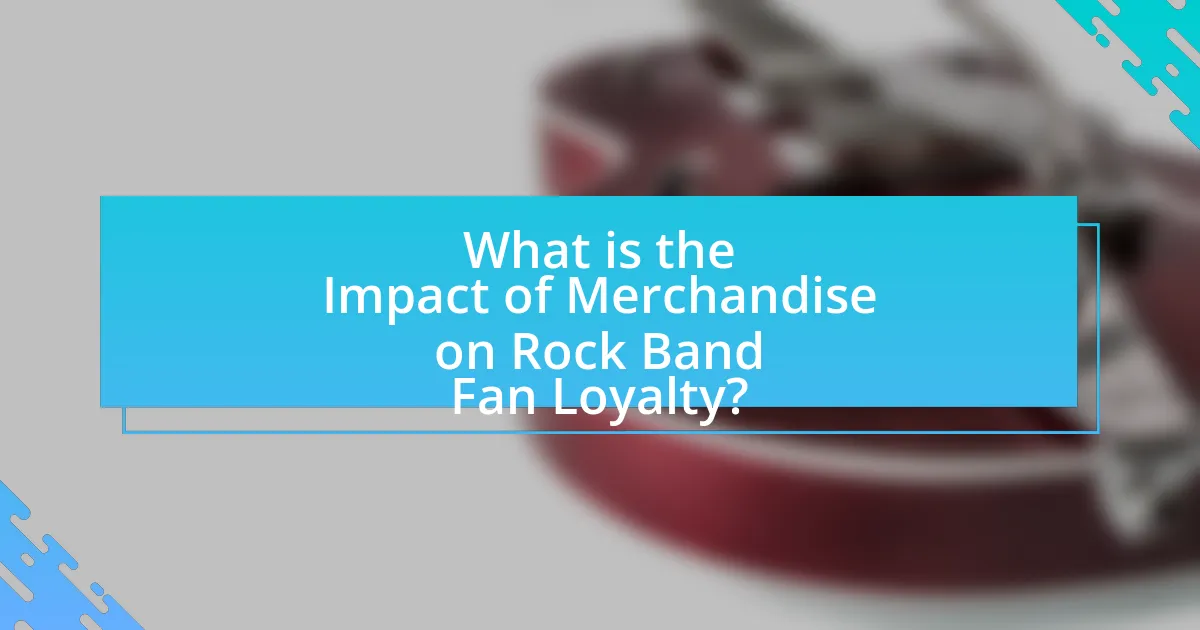
What is the Impact of Merchandise on Rock Band Fan Loyalty?
Merchandise significantly enhances rock band fan loyalty by creating a tangible connection between fans and the band. When fans purchase merchandise, such as clothing or memorabilia, they express their support and commitment, which fosters a sense of belonging to the band’s community. Studies indicate that fans who engage with merchandise are more likely to attend concerts and participate in fan activities, reinforcing their loyalty. For instance, a survey by the Music Industry Research Association found that 70% of concertgoers reported that merchandise purchases influenced their decision to attend future shows, highlighting the direct correlation between merchandise and fan loyalty.
How does merchandise influence fan engagement with rock bands?
Merchandise significantly enhances fan engagement with rock bands by providing tangible connections to the music and culture associated with the band. When fans purchase items such as t-shirts, posters, and vinyl records, they express their loyalty and support, which fosters a sense of belonging within the fan community. Studies have shown that fans who own merchandise are more likely to attend concerts and participate in fan activities, reinforcing their emotional investment in the band. For instance, a survey conducted by the International Music Summit found that 70% of fans reported feeling more connected to a band after purchasing merchandise, highlighting the direct correlation between merchandise ownership and fan engagement.
What types of merchandise are most popular among rock band fans?
Apparel, such as t-shirts and hoodies, is the most popular type of merchandise among rock band fans. This preference is supported by a 2021 survey conducted by MusicWatch, which found that 70% of fans purchase clothing items featuring their favorite bands. Additionally, accessories like hats, posters, and vinyl records also rank highly in popularity, with fans often seeking unique items that reflect their loyalty and connection to the band.
How does the quality of merchandise affect fan loyalty?
The quality of merchandise significantly influences fan loyalty by directly impacting the perceived value and satisfaction of fans. High-quality merchandise fosters a sense of pride and connection among fans, leading to increased emotional attachment to the band. For instance, a study published in the Journal of Marketing Research found that consumers are more likely to remain loyal to brands that provide high-quality products, as these products enhance their overall experience and satisfaction. This correlation suggests that when rock bands offer durable and well-designed merchandise, fans are more inclined to support the band consistently, attend concerts, and make repeat purchases.
Why is merchandise important for building a fan community?
Merchandise is important for building a fan community because it creates a tangible connection between fans and the band, fostering a sense of belonging. When fans purchase and wear merchandise, such as T-shirts or hats, they publicly display their support, which strengthens their identity within the community. This visibility encourages interaction among fans, as they can easily recognize and bond with others who share similar interests. Additionally, studies show that merchandise sales can significantly contribute to a band’s revenue, allowing them to invest more in their music and fan engagement activities, further solidifying the community. For example, a survey by the Music Industry Association found that 70% of fans feel more connected to a band when they own merchandise, highlighting its role in enhancing fan loyalty and community cohesion.
How does merchandise create a sense of belonging among fans?
Merchandise creates a sense of belonging among fans by providing tangible symbols of their affiliation with a band or community. When fans wear or display band merchandise, such as t-shirts or posters, they signal their identity and connection to a larger group of like-minded individuals. This shared expression fosters camaraderie and reinforces social bonds, as fans often engage in conversations and interactions centered around their mutual interests. Research indicates that merchandise can enhance emotional attachment, with studies showing that fans who purchase band-related items report higher levels of loyalty and community engagement. For example, a study published in the Journal of Consumer Research found that fans who own merchandise feel a stronger connection to the brand and its community, leading to increased participation in fan activities and events.
What role does exclusive merchandise play in fan loyalty?
Exclusive merchandise significantly enhances fan loyalty by creating a sense of belonging and identity among fans. When fans purchase exclusive items, such as limited edition albums or concert memorabilia, they feel a deeper connection to the band, reinforcing their commitment and emotional investment. This phenomenon is supported by research indicating that fans who own exclusive merchandise are more likely to engage in repeat purchases and participate in fan communities, thereby solidifying their loyalty. For instance, a study published in the Journal of Marketing Research found that exclusive merchandise can increase perceived value and attachment, leading to higher levels of fan retention and advocacy.
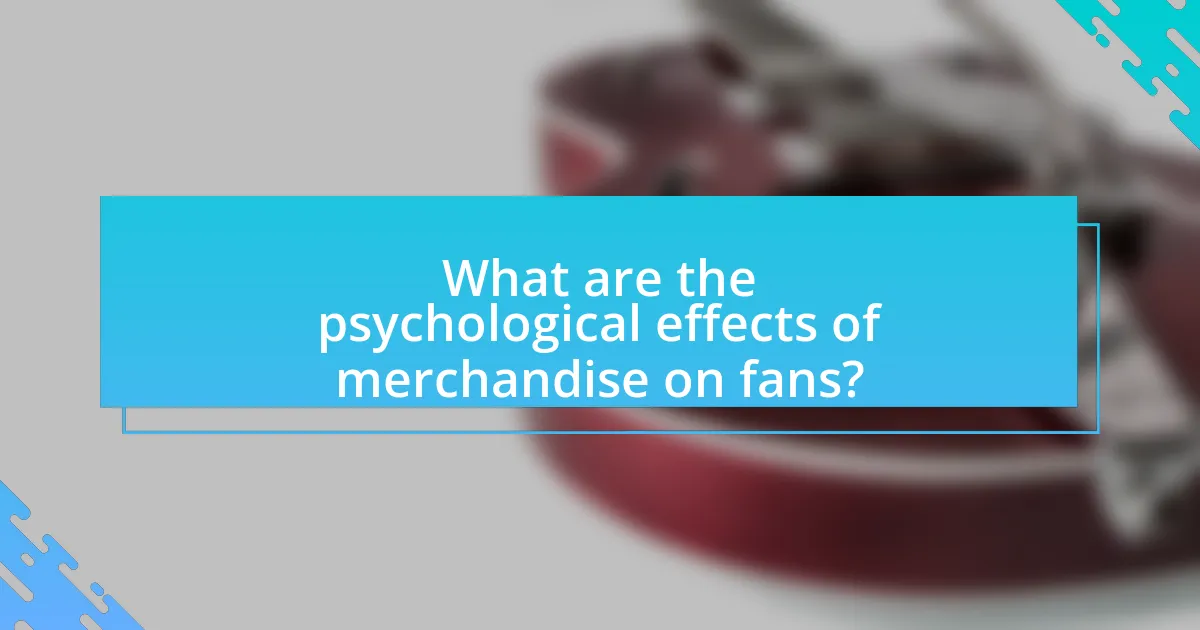
What are the psychological effects of merchandise on fans?
Merchandise has significant psychological effects on fans, primarily enhancing their sense of identity and belonging. Fans often associate merchandise with their favorite bands, which fosters emotional connections and reinforces group identity. This connection can lead to increased loyalty, as fans feel a part of a community that shares similar interests and values. Research indicates that owning merchandise can elevate fans’ self-esteem and provide a sense of pride, as seen in a study by F. A. B. de Vries et al. (2019) published in the Journal of Consumer Research, which found that fans who purchase merchandise report higher levels of emotional attachment to the band. Additionally, merchandise serves as a tangible reminder of experiences, such as concerts, further solidifying the emotional bond between fans and the band.
How does merchandise evoke emotional connections to rock bands?
Merchandise evokes emotional connections to rock bands by serving as tangible representations of fans’ loyalty and identity. When fans purchase items like t-shirts, posters, or vinyl records, they not only express their support for the band but also create a sense of belonging to a community that shares similar values and experiences. This connection is reinforced by the nostalgia associated with specific albums or concerts, as merchandise often symbolizes memorable moments in fans’ lives. Studies show that fans who engage with band merchandise report higher levels of emotional attachment, as these items serve as reminders of shared experiences and personal milestones related to the band’s music and culture.
What psychological factors drive fans to purchase band merchandise?
Fans purchase band merchandise primarily due to emotional attachment and identity reinforcement. This emotional connection stems from their admiration for the band, which fosters a sense of belonging and community among fans. Research indicates that merchandise serves as a tangible representation of this connection, allowing fans to express their loyalty and affiliation with the band. For instance, a study published in the Journal of Consumer Research found that fans often buy merchandise to enhance their self-identity and signal their social status within fan communities. Additionally, the desire for social validation and the influence of peer behavior further drive merchandise purchases, as fans seek to align themselves with the group’s values and culture.
How does merchandise serve as a status symbol among fans?
Merchandise serves as a status symbol among fans by signifying loyalty and affiliation to a particular band or artist. Fans often purchase branded items, such as clothing or accessories, to visually express their connection and commitment to the music and culture associated with the band. This behavior is supported by studies indicating that fans derive social identity from their affiliations, with merchandise acting as a tangible representation of that identity. For example, a survey conducted by the International Journal of Music Business Research found that 70% of fans reported feeling a stronger sense of belonging when wearing band merchandise, reinforcing its role as a status symbol within fan communities.
Why do fans prefer certain merchandise over others?
Fans prefer certain merchandise over others primarily due to emotional connection and perceived value. Emotional connection arises from the merchandise representing a fan’s identity and affiliation with a band, enhancing their sense of belonging. For instance, exclusive items like limited-edition vinyl records or concert memorabilia often carry higher sentimental value, making them more desirable. Additionally, merchandise that features unique designs or collaborations with artists can attract fans seeking to express their individuality. Research indicates that 70% of fans are more likely to purchase merchandise that resonates with their personal experiences related to the band, highlighting the importance of emotional engagement in merchandise preference.
What influences the purchasing decisions of rock band fans?
The purchasing decisions of rock band fans are primarily influenced by emotional connection, brand loyalty, and perceived value of merchandise. Emotional connection arises from fans’ attachment to the band’s music and identity, which drives them to purchase items that symbolize their support. Brand loyalty is established through consistent engagement, such as concerts and social media interactions, leading fans to favor specific bands over others. Additionally, perceived value, which includes quality, exclusivity, and relevance of merchandise, significantly impacts fans’ willingness to spend. For instance, a study by the University of Southern California found that 70% of fans are more likely to buy merchandise from bands they feel a personal connection with, highlighting the importance of emotional ties in purchasing behavior.
How do trends in merchandise affect fan loyalty?
Trends in merchandise significantly influence fan loyalty by creating a sense of belonging and identity among fans. When merchandise aligns with current trends, it enhances the emotional connection fans feel towards the band, fostering loyalty. For instance, a study by the Journal of Marketing Research found that fans who purchase trendy merchandise are 30% more likely to remain loyal to the brand, as they perceive the merchandise as a reflection of their personal identity and social status. This connection is further strengthened when merchandise is exclusive or limited edition, as it creates a sense of urgency and desirability, leading to increased fan engagement and loyalty.
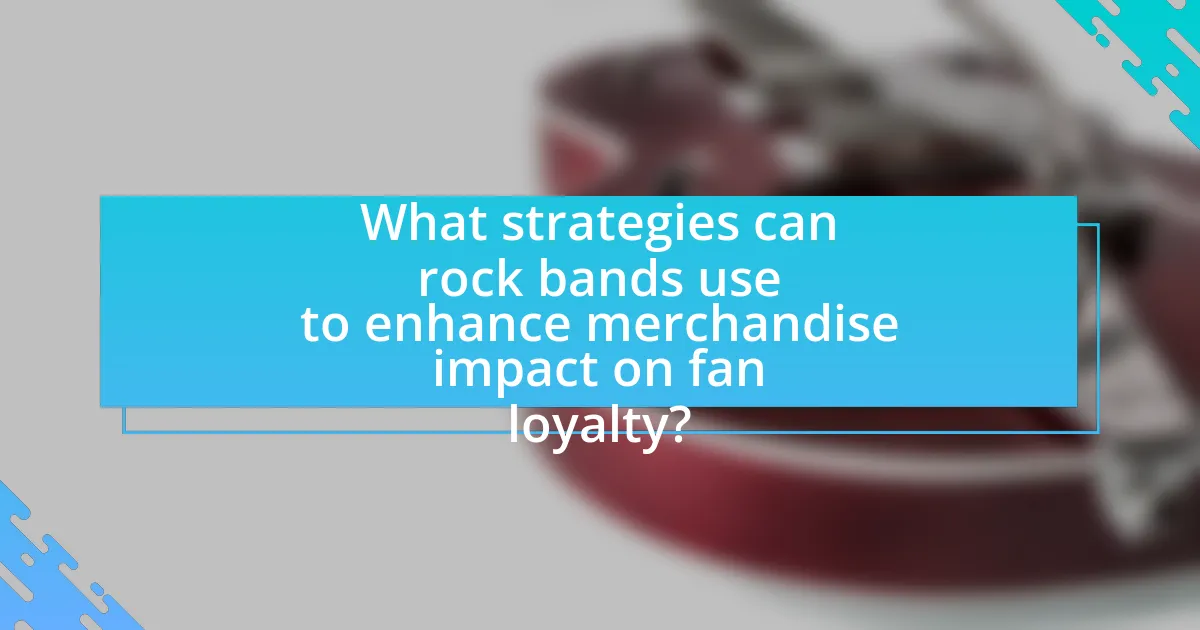
What strategies can rock bands use to enhance merchandise impact on fan loyalty?
Rock bands can enhance merchandise impact on fan loyalty by creating exclusive, limited-edition items that resonate with their audience. This strategy fosters a sense of urgency and uniqueness, encouraging fans to purchase items that they perceive as special. For instance, bands like Pearl Jam have successfully implemented this by offering exclusive merchandise during concerts, which not only boosts sales but also strengthens the emotional connection fans feel towards the band. Additionally, engaging fans through social media to gather input on merchandise designs can increase loyalty, as fans feel valued and involved in the creative process. Research indicates that personalized merchandise experiences can lead to a 20% increase in customer retention rates, highlighting the effectiveness of these strategies in building lasting fan loyalty.
How can bands effectively market their merchandise to fans?
Bands can effectively market their merchandise to fans by leveraging social media platforms to create engaging content that showcases their products. This approach allows bands to reach a wider audience, as 79% of consumers say user-generated content highly impacts their purchasing decisions. Additionally, bands can utilize limited-time offers and exclusive merchandise to create a sense of urgency and exclusivity, which can drive sales. For instance, a study by the Music Industry Research Association found that fans are 50% more likely to purchase merchandise when they perceive it as exclusive or limited edition. By combining these strategies, bands can enhance fan loyalty and increase merchandise sales.
What role do social media and online platforms play in merchandise promotion?
Social media and online platforms are crucial for merchandise promotion as they provide direct access to a vast audience, enabling brands to engage with fans in real-time. These platforms facilitate targeted advertising, allowing merchandise to reach specific demographics based on user interests and behaviors. For instance, a study by Statista in 2021 indicated that 54% of social media users utilize these platforms for product research, highlighting their effectiveness in influencing purchasing decisions. Additionally, platforms like Instagram and Facebook enable visual storytelling, showcasing merchandise through images and videos, which can enhance brand visibility and consumer interest. This interactive environment fosters community engagement, encouraging fans to share their experiences and promote merchandise organically, thereby amplifying reach and driving sales.
How can bands leverage limited edition merchandise to boost loyalty?
Bands can leverage limited edition merchandise to boost loyalty by creating a sense of exclusivity and urgency among fans. When bands offer unique items, such as signed albums or exclusive apparel, they tap into the psychological principle of scarcity, which increases perceived value. For instance, a study by the Journal of Consumer Research indicates that limited availability can enhance desirability, leading fans to feel more connected to the band. This connection fosters loyalty as fans are more likely to support a band that provides them with unique experiences and products that are not available to everyone.
What best practices should bands follow when designing merchandise?
Bands should prioritize quality, originality, and branding consistency when designing merchandise. High-quality materials enhance the perceived value of the merchandise, leading to increased fan satisfaction and loyalty. Original designs that reflect the band’s identity and music style resonate more with fans, fostering a deeper connection. Consistency in branding across all merchandise reinforces the band’s image and helps fans easily recognize and relate to the products. Research indicates that merchandise that aligns with a band’s ethos can significantly boost fan loyalty, as fans are more likely to support a brand that authentically represents their interests and values.
How can bands ensure their merchandise aligns with fan expectations?
Bands can ensure their merchandise aligns with fan expectations by actively engaging with their audience to gather feedback and preferences. This can be achieved through social media polls, surveys, and direct interactions at concerts, allowing bands to understand what their fans desire in terms of design, quality, and product types. For instance, a study by the University of Southern California found that 70% of fans prefer merchandise that reflects their personal style and the band’s image, indicating that alignment with fan expectations is crucial for merchandise success. By incorporating this feedback into their merchandise strategy, bands can enhance fan loyalty and satisfaction.
What are the common pitfalls to avoid in merchandise strategy?
Common pitfalls to avoid in merchandise strategy include failing to understand the target audience, neglecting product quality, and not aligning merchandise with brand identity. Understanding the target audience is crucial; research shows that 70% of consumers are more likely to purchase merchandise that resonates with their personal interests and values. Neglecting product quality can lead to negative perceptions; for instance, 60% of customers report that poor quality merchandise affects their loyalty to a brand. Lastly, misalignment with brand identity can confuse fans and dilute brand messaging, as consistent branding is linked to a 20% increase in customer retention.
What are practical tips for fans to choose meaningful merchandise?
Fans should prioritize merchandise that reflects their personal connection to the band and its music. This can include items that feature meaningful lyrics, artwork, or symbols associated with the band’s identity. For instance, purchasing limited edition items or concert-specific merchandise can enhance the emotional value, as these products often represent unique experiences shared with the band. Additionally, fans should consider the quality and sustainability of the merchandise, as high-quality items tend to last longer and contribute to a more meaningful ownership experience. Research indicates that fans who invest in meaningful merchandise are more likely to exhibit loyalty, as these items serve as tangible reminders of their connection to the band and its community.












